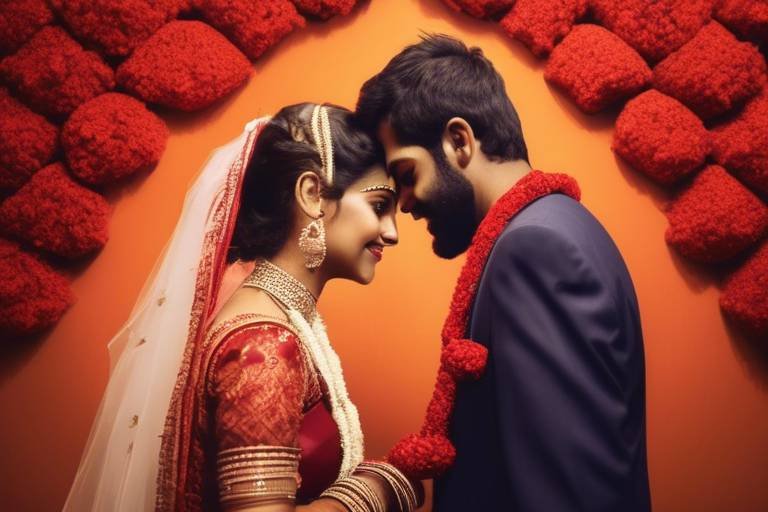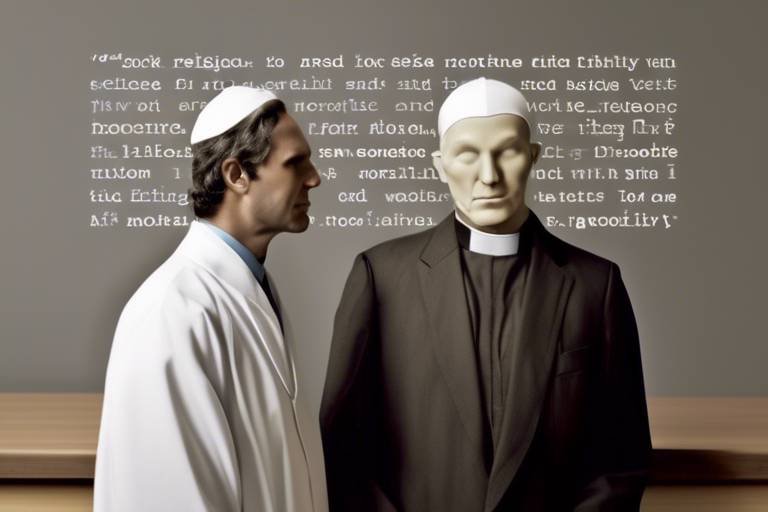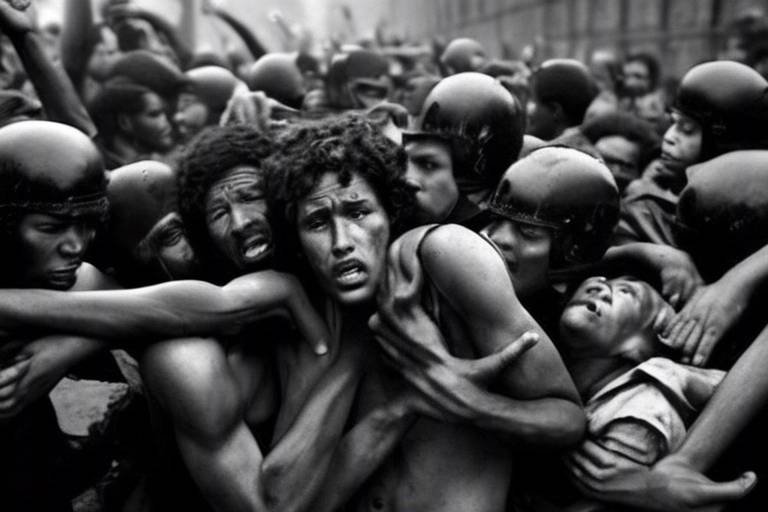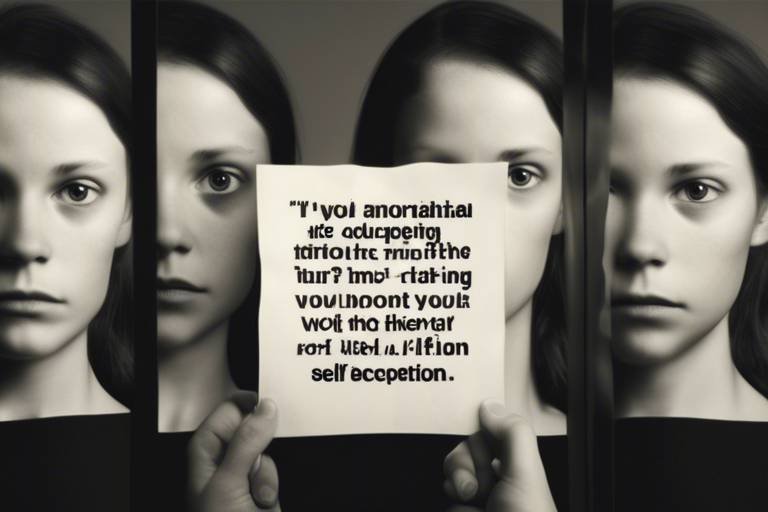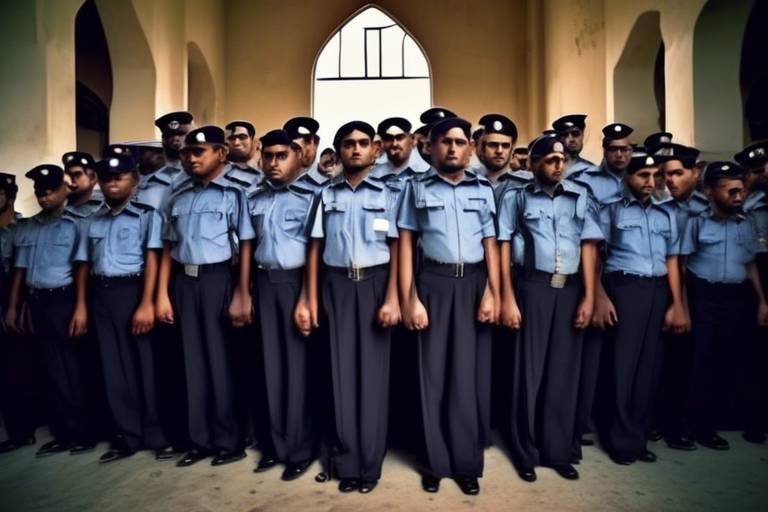Are Arranged Marriages Morally Defensible?
When we dive into the world of arranged marriages, the conversation often turns to morality. Are these unions a beautiful blend of tradition and family values, or do they infringe upon individual freedom and choice? It's a complex topic that stirs up emotions and sparks debates across cultures. Arranged marriages, which have been a staple in many societies for centuries, bring with them a rich tapestry of cultural significance and familial bonds. But as we navigate through modernity, we must ask ourselves: can these age-old practices stand up to the scrutiny of contemporary ethical standards?
To understand the moral implications of arranged marriages, we first need to explore their cultural context. In many societies, marriage is not just a union between two individuals but a significant event that ties families together. This collective approach to marriage can foster a sense of community and support, as families often play a crucial role in the selection of partners. However, this raises questions about individual autonomy. Are individuals truly free to choose their partners, or are they merely fulfilling a role dictated by tradition? The answer is not always clear-cut.
Consent, a cornerstone of any marriage, takes on a unique dimension in arranged marriages. While many individuals may feel they have agreed to the union willingly, it's essential to consider the pressures that might influence their decision. In some cases, familial expectations can weigh heavily on an individual's choice, leading to a situation where consent is given, but perhaps not entirely freely. This dynamic can complicate the moral standing of arranged marriages, as the line between choice and obligation often blurs.
Parental influence is another critical factor in the discussion of arranged marriages. Parents often take on the role of matchmakers, believing they know what is best for their children. While this can lead to successful unions based on shared values and backgrounds, it can also stifle personal desires and aspirations. Imagine a young person feeling the weight of their parents' expectations, torn between their own dreams and the desire to honor family tradition. This tug-of-war can create a moral dilemma that challenges the very foundation of personal autonomy.
Moreover, societal expectations play a significant role in shaping perceptions of arranged marriages. In many cultures, there is an unspoken pressure to conform to traditional practices. This societal lens can make it difficult for individuals to break away from the norm, even if they desire to. The moral implications of conforming to these expectations are profound, as they can lead to a life that feels more like a performance than a genuine expression of love and partnership.
When we compare arranged marriages to love marriages, we uncover a spectrum of values and beliefs. Love marriages often prioritize emotional fulfillment and personal compatibility, while arranged marriages may emphasize familial harmony and cultural alignment. Each has its strengths and weaknesses, but the question remains: which is more morally defensible? The answer often lies in the eyes of the beholder, as personal experiences and cultural backgrounds shape perspectives.
Statistics and studies provide insight into the success rates of arranged marriages, often revealing surprising results. Many arranged marriages report high levels of satisfaction and longevity, challenging the notion that love must precede marriage for it to be successful. Factors such as communication, compatibility, and family support play vital roles in the success of these unions. However, challenges still exist, including cultural clashes and generational differences that can complicate relationships.
In conclusion, the moral defensibility of arranged marriages is a multifaceted issue that encompasses cultural traditions, individual autonomy, and societal expectations. As we continue to navigate the complexities of modern relationships, it's crucial to engage in open conversations about these practices, recognizing that morality is often subjective and influenced by a myriad of factors. The path to understanding arranged marriages requires empathy, respect for cultural practices, and a commitment to ensuring individual voices are heard.
- What is an arranged marriage? An arranged marriage is a marital union where the families of the bride and groom play a significant role in selecting the partners, often based on cultural, social, or economic considerations.
- Are arranged marriages successful? Many studies indicate that arranged marriages can be successful, with high levels of satisfaction reported by couples, often due to shared values and family support.
- Do individuals have a say in arranged marriages? While many individuals in arranged marriages have a say in their partner selection, the degree of autonomy can vary significantly based on cultural and familial expectations.
- How do arranged marriages compare to love marriages? Arranged marriages often focus on family compatibility and cultural alignment, while love marriages prioritize emotional connection and personal choice.

Cultural Context of Arranged Marriages
Arranged marriages are not just a practice; they are a cultural phenomenon deeply embedded in the fabric of societies around the world. In many cultures, marriage is seen as a union not just between two individuals, but between two families. This perspective shifts the focus from personal choice to a collective agreement that upholds family honor, social status, and cultural continuity. For instance, in countries like India, Pakistan, and many Middle Eastern nations, arranged marriages are common and often celebrated as a tradition that strengthens familial bonds and societal ties.
In these cultures, the values and beliefs surrounding marriage can significantly influence how individuals perceive their roles within a union. Arranged marriages often come with a set of expectations, where the roles of husband and wife are defined by cultural norms. These norms dictate not only the behavior of the individuals involved but also the dynamics of their relationship. For many, this means that love may develop over time, rather than being the initial basis for the union. In fact, studies have shown that love can grow in arranged marriages, often leading to deep emotional connections that may not be immediately apparent.
Moreover, the cultural context of arranged marriages often reflects a broader societal framework. In many communities, factors such as caste, religion, and socioeconomic status play a crucial role in partner selection. Families may prioritize these factors to ensure compatibility, stability, and adherence to tradition. This leads to a fascinating interplay between individual desires and collective expectations. While some individuals may feel a sense of duty to comply with arranged marriage practices, others may struggle with the pressure to conform, leading to a complex emotional landscape.
It's also important to note that as societies evolve, so do the perceptions of arranged marriages. With globalization and the influence of Western ideals, younger generations are often caught between the traditional expectations of their families and their personal aspirations for love and partnership. This tension can lead to a re-evaluation of what marriage means in a modern context. For instance, many young individuals now seek a balance between respecting their cultural heritage and pursuing their individual happiness.
To illustrate this cultural diversity, consider the following table that outlines various cultural perspectives on arranged marriages:
| Country | Common Practices | Influencing Factors |
|---|---|---|
| India | Family involvement, caste considerations | Religion, socioeconomic status |
| Japan | Omiai (formal marriage meetings) | Family approval, social standing |
| Middle East | Arranged by parents, dowries | Cultural traditions, honor |
| Western Countries | Modern adaptations, dating services | Individual choice, cultural integration |
In conclusion, the cultural context of arranged marriages is rich and varied, shaped by historical traditions and evolving societal norms. As we continue to explore this topic, it becomes clear that arranged marriages are not merely a relic of the past but a dynamic practice that adapts to the changing landscape of human relationships. Understanding these cultural nuances is vital in evaluating the moral implications of arranged marriages in today’s world.

Individual Autonomy and Choice
When we dive into the topic of arranged marriages, one of the most compelling aspects we encounter is the concept of individual autonomy. This notion revolves around the idea that each person should have the freedom to make choices about their own life, especially regarding something as significant as marriage. But how does this principle hold up in the context of arranged marriages? Are individuals truly free to choose, or are they subtly coerced into conforming to family expectations?
In many cultures where arranged marriages are prevalent, the idea of family honor and societal approval often takes precedence over personal desires. This raises a crucial question: does the involvement of family in choosing a partner diminish the autonomy of the individuals involved? On one hand, families often have the best intentions, believing that they can select a partner who aligns with cultural values, social status, and economic stability. On the other hand, this can lead to a situation where personal feelings and preferences are sidelined, creating a potential conflict between individual desires and familial obligations.
Moreover, the extent to which personal choice is respected can vary significantly. In some cases, individuals may have a say in the selection process, leading to a hybrid model where both family input and personal choice coexist. For instance, a young woman might be presented with a few suitable candidates and allowed to express her preferences, creating a more balanced dynamic. However, in other situations, the pressure to accept a family-chosen partner can be overwhelming, making one wonder if true consent is achievable.
To better understand this dynamic, let's take a look at some of the factors that influence individual autonomy in arranged marriages:
- Communication: Open lines of communication between family members and the individuals involved can foster a sense of autonomy. When families encourage discussions about preferences and feelings, it allows for a more collaborative approach.
- Education: Individuals who are educated about their rights and options may feel more empowered to voice their opinions and make choices that align with their personal desires.
- Generational Differences: Younger generations often have different views on marriage compared to their parents, leading to potential clashes between traditional expectations and modern values.
It's also essential to consider the role of consent in these arrangements. Consent should be informed and voluntary, yet the reality can be more complex. Many individuals might feel pressured to acquiesce to family wishes, fearing the repercussions of defying tradition. This brings us back to the question of whether arranged marriages can be morally defensible if the individual's autonomy is compromised.
In conclusion, while arranged marriages can provide a framework that respects cultural traditions, they must also prioritize the individual autonomy of those involved. Balancing family input with personal choice is crucial in ensuring that individuals feel empowered rather than constrained. As societies evolve and modern values seep into traditional practices, the challenge remains: how do we honor cultural heritage while also championing the rights and desires of individuals?
- Are arranged marriages forced? Not always. While some may experience pressure, many arranged marriages involve discussions and mutual consent.
- Do arranged marriages lead to successful relationships? Research suggests that many arranged marriages can be successful, with higher levels of satisfaction reported in some studies.
- How can individuals ensure their autonomy in arranged marriages? Open communication with family and expressing personal preferences can help maintain individual autonomy.

Consent in Arranged Marriages
When we think about marriage, the word consent often pops up as a cornerstone of the relationship. In the context of arranged marriages, however, the meaning and implications of consent can become quite complex. It's essential to understand that while the idea of consent is straightforward—it's about agreeing to something—its application in arranged marriages can be layered with cultural nuances, familial expectations, and personal feelings.
In many cultures, arranged marriages are seen as a traditional practice where families play a pivotal role in selecting partners. This raises an important question: How much choice do individuals truly have? While some may argue that individuals are given a choice, the reality is often more nuanced. For instance, in certain societies, the pressure to conform to family expectations can overshadow personal desires. This is where the concept of informed consent becomes crucial. Are individuals fully aware of their options? Are they genuinely consenting, or are they merely acquiescing to familial pressure?
To illustrate this, let’s consider a few scenarios:
- Scenario A: A young woman feels immense pressure from her parents to marry a man they have chosen, despite her feelings for someone else. She may agree to the marriage, but is this a true expression of her will?
- Scenario B: A couple meets through an arranged setup but develops a genuine connection over time. Here, consent evolves as both parties actively engage in the relationship.
In the first scenario, the consent is questionable. The young woman may not feel free to voice her true feelings, which raises ethical concerns about the validity of her consent. In contrast, the second scenario highlights how consent can be a dynamic process, where both individuals choose to engage with one another, thus reinforcing their autonomy.
Another aspect to consider is the role of communication. Open discussions between the families and the individuals involved can facilitate a better understanding of consent. When both parties are encouraged to voice their opinions and feelings, the arranged marriage can transform into a partnership based on mutual respect and understanding. This is especially important in cultures where arranged marriages are common, as it can help bridge the gap between tradition and modern values.
Furthermore, it is crucial to examine how consent is perceived within different cultural contexts. In some cultures, consent may be viewed as a formality, while in others, it is a deeply personal and significant aspect of the union. This cultural lens can significantly influence how individuals perceive their own agency in the decision-making process.
Ultimately, the question of consent in arranged marriages is not just about whether individuals agree to marry; it’s about the quality of that agreement. Are individuals entering into these unions with a sense of empowerment or are they feeling coerced? The answer to this question can vary widely depending on personal circumstances and cultural backgrounds.
In conclusion, while arranged marriages can offer a framework for partnership, the ethical implications surrounding consent cannot be overlooked. It is essential for individuals to feel empowered in their choices, ensuring that their consent is not just given, but is also genuinely informed and freely expressed.
- What is the difference between arranged marriages and love marriages? Arranged marriages are typically orchestrated by families, while love marriages involve individuals choosing their partners based on personal feelings.
- Is consent always respected in arranged marriages? Consent can vary greatly; while some individuals may feel empowered, others may feel pressured, making it essential to evaluate each situation individually.
- How can families support individual choice in arranged marriages? Families can encourage open communication and respect for personal feelings, ensuring that individuals feel free to express their desires.

Parental Influence
Parental influence plays a pivotal role in the dynamics of arranged marriages, often acting as both a guiding force and a source of tension. In many cultures, parents are seen as the primary architects of their children's marital futures, believing that their life experience equips them to choose suitable partners. This traditional view can lead to a sense of security, as parents often prioritize familial values and social compatibility over individual desires. However, this influence can also pose significant challenges to the autonomy of the individuals involved.
Parents typically consider various factors when selecting a partner for their child, including:
- Social Status: Families often seek alliances that can enhance their social standing, leading to a preference for partners from similar backgrounds.
- Cultural Compatibility: Shared cultural values and traditions are deemed essential for a harmonious relationship.
- Financial Stability: Economic considerations can heavily influence parental choices, as stability is often equated with a successful marriage.
While these factors may seem practical, they can sometimes overshadow the personal preferences and emotional needs of the individuals involved. Imagine being in a situation where your parents choose your partner based on a checklist of attributes, while your heart yearns for someone entirely different. This is where the complexity of parental influence becomes apparent. It raises questions about the balance between respecting parental wisdom and honoring individual choice.
Moreover, the pressure to conform to parental expectations can lead to feelings of resentment and frustration among those entering arranged marriages. Young adults may feel trapped between their desire for autonomy and their obligation to honor familial traditions. This tug-of-war can create a rift in relationships, as individuals grapple with the challenge of meeting their parents' expectations while trying to carve out their own identities.
Interestingly, the influence of parents does not end once the marriage is arranged. In many cases, parents continue to play an active role in the couple's life, offering advice or intervening in conflicts. This ongoing involvement can be a double-edged sword. On one hand, it can provide support and guidance; on the other, it may stifle the couple's ability to navigate their relationship independently. It raises the question: when does parental support become overbearing?
In conclusion, while parental influence in arranged marriages is often rooted in love and concern, it can complicate the dynamics of individual autonomy and personal happiness. Striking a balance between honoring tradition and fostering individual choice remains a challenge in many cultures. As society evolves, the conversation around parental influence in marriage continues to grow, prompting a reevaluation of what it means to marry in the modern world.
- What is the role of parents in arranged marriages? Parents often select partners based on cultural, social, and economic factors, aiming to ensure compatibility and stability.
- How does parental influence affect individual autonomy? Parental expectations can sometimes overshadow personal desires, creating tension between tradition and individual choice.
- Can parental involvement be beneficial? Yes, parental support can provide guidance and stability, but it is essential that it does not become overbearing.

Societal Expectations
In many cultures, play a pivotal role in shaping the dynamics of arranged marriages. These expectations often stem from long-standing traditions that dictate how relationships should form and evolve. For instance, in societies where arranged marriages are prevalent, there is a strong belief that marriage is not just a union between two individuals but a bond between families. This perspective emphasizes the importance of family reputation, cultural heritage, and economic stability, which can sometimes overshadow the personal desires of the individuals involved.
The pressure to conform to these societal norms can be immense. Many young people find themselves navigating a landscape where their personal preferences may clash with what is expected of them. This leads to a complex interplay between individual desires and cultural obligations. In some cases, individuals may feel that choosing a partner outside of their family's approval could result in social ostracism or familial disapproval, which can be incredibly daunting.
Moreover, societal expectations often extend beyond the act of marriage itself. They can dictate the timeline for marriage, the qualities deemed desirable in a partner, and even the rituals and ceremonies that accompany the union. For example, in many cultures, there are specific traits that families look for in a potential spouse, such as educational background, financial stability, and adherence to cultural practices. This can create a checklist that individuals feel pressured to meet, often at the expense of their own happiness.
To illustrate this further, consider the following table that outlines some common societal expectations in arranged marriages across different cultures:
| Culture | Common Expectations |
|---|---|
| Indian | Family approval, caste compatibility, financial stability |
| Middle Eastern | Honor, family reputation, adherence to religious practices |
| East Asian | Educational attainment, career prospects, filial piety |
As we can see, these expectations are not merely suggestions; they are often deeply entrenched in the fabric of society. The weight of these norms can lead individuals to question their own desires and aspirations. This raises an important question: Is it fair to prioritize societal expectations over personal happiness? Many argue that while tradition has its place, the evolution of personal choice and individual freedom should also be recognized and valued.
In conclusion, societal expectations surrounding arranged marriages can significantly influence personal decisions, often leading to a conflict between individual autonomy and cultural traditions. While these expectations may provide a framework for relationships, they can also impose limitations that challenge the very essence of love and partnership. As we continue to explore the evolving landscape of marriage, it becomes increasingly crucial to find a balance between respecting cultural heritage and embracing the right to choose one’s own path in love.

Comparative Analysis with Love Marriages
When we dive into the world of relationships, the debate between arranged marriages and love marriages often takes center stage. Both types of unions come with their unique flavors, but how do they really stack up against each other? Think of arranged marriages as a carefully curated playlist, where parents or family members select the songs based on what they believe will resonate with the couple. On the other hand, love marriages are like creating your own playlist, filled with songs that speak to your heart and soul. The question arises: which approach leads to a happier and more fulfilling relationship?
One of the most significant differences lies in the foundation of these marriages. Arranged marriages are typically built on the pillars of family values, cultural expectations, and social compatibility. Families often conduct extensive background checks, exploring not just the individual but also their family lineage. This can create a sense of security, as both partners might share similar values and goals. In contrast, love marriages are founded on personal feelings and emotional connections. Couples often choose each other based on attraction, shared interests, and mutual respect, leading to a different kind of bond.
However, the emotional fulfillment in both types of marriages can vary widely. While love marriages may initially seem to offer more excitement and passion, they can also face challenges, such as unrealistic expectations. Couples might enter the relationship with the belief that love alone can conquer all, which may lead to disappointment when reality sets in. On the flip side, arranged marriages, which might start with less emotional intimacy, often evolve over time. Couples learn to navigate their differences and build a partnership based on trust and understanding, sometimes resulting in a deeper bond than they initially expected.
To further illustrate the differences, let’s look at some key aspects:
| Aspect | Arranged Marriages | Love Marriages |
|---|---|---|
| Foundation | Family values and social compatibility | Personal feelings and attraction |
| Emotional Fulfillment | Gradually develops over time | Immediate but may fade |
| Expectations | Defined by family and tradition | Often high, based on romance |
| Conflict Resolution | Involves family support | Relies on couple’s communication |
In conclusion, while both arranged and love marriages have their pros and cons, the ultimate success of either type often hinges on the individuals involved. Communication, mutual respect, and adaptability are crucial factors that can determine the longevity of the relationship. Just like a well-balanced diet, a successful marriage requires a mix of ingredients: love, understanding, patience, and sometimes a sprinkle of tradition. So, whether you find yourself in an arranged marriage or a love marriage, it’s the commitment to grow together that truly counts.
- Are arranged marriages forced? - While some arranged marriages may involve pressure, many are consensual, with the individuals having a say in the final decision.
- Do love marriages have a higher success rate? - Success rates can vary widely; factors such as communication and compatibility play a significant role in both types of marriages.
- Can love grow in arranged marriages? - Absolutely! Many couples in arranged marriages develop deep emotional connections over time.
- What are the common challenges in love marriages? - Love marriages can face challenges like unrealistic expectations, family disapproval, and differences in backgrounds.

Success Rates of Arranged Marriages
When it comes to the success rates of arranged marriages, the conversation often leads to a fascinating intersection of culture, tradition, and modern values. Many people wonder, "Do arranged marriages really work?" The answer is more complex than a simple yes or no. Studies have shown that arranged marriages can have surprisingly high success rates, often attributed to the foundational support of family and community. In fact, some reports suggest that arranged marriages have a success rate of around 70-80%, which is comparable to love marriages. This statistic might raise eyebrows, but it opens up a dialogue about what constitutes a successful relationship.
One of the key factors contributing to the success of arranged marriages is the emphasis on compatibility. Families often consider various aspects, such as education, social status, and even astrological compatibility, when selecting a partner. This careful consideration can lead to a strong foundation for the marriage, as the couple is likely to share similar values and life goals. Moreover, the involvement of families can foster a sense of responsibility and commitment that sometimes is less pronounced in love marriages, where individuals may rush into relationships based on infatuation rather than a thorough understanding of their partner.
However, it’s essential to acknowledge that success in arranged marriages is not without its challenges. For instance, couples may face pressure to conform to family expectations, which can lead to stress and conflict. Additionally, the transition from being a stranger to a life partner can be daunting. Many couples in arranged marriages describe their journey as a gradual process of learning and growing together, often requiring open communication and a willingness to adapt.
To further understand the dynamics at play, let’s take a look at some statistics that illustrate the success rates of arranged marriages compared to love marriages:
| Type of Marriage | Success Rate (%) | Common Challenges |
|---|---|---|
| Arranged Marriages | 70-80 | Family pressure, cultural clashes |
| Love Marriages | 50-60 | Infatuation, unrealistic expectations |
This table highlights the contrasting success rates and challenges faced by both types of marriages. It’s clear that while love marriages may offer the allure of romance, arranged marriages often bring a different kind of stability rooted in family support and shared values. In many cultures, the idea of marrying for love is still a relatively new concept, and as such, the traditional arranged marriage model continues to thrive.
Ultimately, the success of any marriage—whether arranged or based on love—depends on the individuals involved. Factors such as communication, mutual respect, and the ability to compromise play vital roles in determining the longevity and satisfaction of the relationship. So, while arranged marriages might come with their unique set of challenges, they also offer a framework that can lead to lasting partnerships built on a strong foundation.

Factors Contributing to Success
When it comes to arranged marriages, several factors play a crucial role in determining their success. While many might assume that love is the only foundation for a lasting relationship, the reality is that arranged marriages can thrive on a variety of elements that promote harmony and understanding. One of the most significant factors is communication. Open and honest communication between partners allows them to express their needs, desires, and concerns, fostering a deeper connection. It’s almost like building a bridge; the stronger the communication, the sturdier the bridge that connects the two individuals.
Another vital aspect is compatibility. In arranged marriages, families often consider various factors such as cultural background, values, and lifestyle when selecting partners. This careful consideration can lead to a higher degree of compatibility, which is essential for a successful union. Think of it as a puzzle; when the pieces fit together well, the overall picture is more likely to be harmonious. Additionally, family support plays a significant role. When families are involved and supportive, it creates a safety net for the couple, encouraging them to thrive together. This support can manifest in various ways, from emotional backing to practical assistance in navigating challenges.
Moreover, shared values and goals can significantly enhance the prospects of success in arranged marriages. Couples who align on fundamental beliefs and aspirations often find it easier to work together towards a common future. This alignment can be likened to two ships sailing in the same direction; when they share the same destination, their journey becomes much smoother.
Finally, adaptability is crucial. In a world that is constantly evolving, the ability to adjust to new circumstances and embrace change can make or break a marriage. Couples who are willing to grow together, learn from each other, and adapt to modern values while respecting their traditions often find greater success. It's like a dance; if both partners are willing to step in sync, they create a beautiful performance together.
- What are the main advantages of arranged marriages? Arranged marriages often provide a strong support system, compatibility based on shared values, and family backing, which can lead to successful unions.
- How do arranged marriages compare to love marriages in terms of success rates? Studies suggest that arranged marriages can have comparable or even higher success rates than love marriages, particularly when families are involved in the process.
- Can love develop in an arranged marriage? Absolutely! Many couples in arranged marriages find that love can grow over time as they get to know each other and build a life together.
- What role does communication play in the success of arranged marriages? Effective communication is vital in any relationship; it helps partners express their feelings, resolve conflicts, and strengthen their bond.

Challenges Faced in Arranged Marriages
Arranged marriages, while often celebrated for their cultural significance and familial support, are not without their challenges. One of the most pressing issues is the potential for cultural clashes. In a world that is increasingly globalized, individuals from different backgrounds may find themselves paired together, leading to misunderstandings and conflicts over traditions, values, and lifestyles. For instance, one partner may prioritize traditional customs while the other leans towards modern practices, creating a rift that can be difficult to bridge.
Another significant challenge is the generational gap that often exists in arranged marriages. Parents and elders may have a specific vision of what a successful marriage looks like, which can clash with the younger generation's desire for independence and personal choice. This difference in perspective can lead to tensions, as younger individuals may feel pressured to conform to their parents' expectations while trying to assert their own identities. The struggle between respecting family traditions and pursuing personal happiness can create a complex emotional landscape.
Moreover, the adaptation to modern values presents its own set of hurdles. Many individuals entering arranged marriages may find themselves caught between the expectations of their families and the realities of contemporary relationships. For example, the rise of individualism and the emphasis on personal happiness can conflict with the collective approach often inherent in arranged marriages. This can lead to feelings of isolation or dissatisfaction, as individuals navigate their roles within the marriage.
Communication is another critical aspect that can either make or break an arranged marriage. While some couples may find it easy to express their thoughts and feelings, others might struggle due to cultural norms that discourage open dialogue. This lack of communication can exacerbate misunderstandings and lead to resentment over time. In some cases, partners may feel like they are living with a stranger, as they have not had the opportunity to truly get to know one another before tying the knot.
Ultimately, while arranged marriages can provide a strong support system through family involvement, they are not immune to challenges. Couples must navigate the intricacies of cultural expectations, generational differences, and the need for open communication to foster a healthy and fulfilling relationship. Recognizing these challenges is the first step toward addressing them and ensuring that arranged marriages can thrive in both traditional and modern contexts.
- What are the common challenges faced in arranged marriages?
Common challenges include cultural clashes, generational differences, and adapting to modern values. - How can couples improve communication in arranged marriages?
Couples can improve communication by setting aside dedicated time to talk openly about their feelings, expectations, and concerns. - Are arranged marriages successful?
Success rates vary, but many arranged marriages thrive with strong family support and effective communication. - What role does parental influence play in arranged marriages?
Parental influence can shape partner selection and expectations, which can impact individual autonomy and marital dynamics.
Frequently Asked Questions
- What are arranged marriages?
Arranged marriages are unions where the partners are selected by individuals other than the couple themselves, often family members. This practice is deeply rooted in various cultures and is guided by societal values and traditions.
- Are arranged marriages morally defensible?
The morality of arranged marriages is a complex topic. While some argue they can uphold cultural traditions and family values, others believe they may compromise individual autonomy and personal choice.
- How does consent work in arranged marriages?
Consent in arranged marriages is crucial, yet it can be nuanced. Often, families discuss potential matches with the individuals involved, but there may be subtle pressures at play that can affect true consent.
- What role do parents play in arranged marriages?
Parents typically play a significant role in selecting partners for their children in arranged marriages. Their influence can shape the dynamics of the relationship, which raises questions about the autonomy of the individuals involved.
- How do societal expectations impact arranged marriages?
Societal norms can heavily influence the acceptance of arranged marriages. Individuals may feel compelled to conform to these expectations, which can complicate personal decisions regarding marriage.
- How do arranged marriages compare to love marriages?
Arranged marriages and love marriages each have their strengths and weaknesses. While love marriages often emphasize emotional fulfillment, arranged marriages may focus on compatibility and family support, which can also lead to successful unions.
- What are the success rates of arranged marriages?
Statistics on arranged marriages show varying success rates. Many studies suggest that arranged marriages can be just as successful, if not more so, than love marriages, depending on cultural contexts and individual circumstances.
- What factors contribute to the success of arranged marriages?
Key factors that contribute to the success of arranged marriages include effective communication, compatibility between partners, and robust family support systems that help navigate challenges.
- What challenges do arranged marriages face?
Arranged marriages can encounter unique challenges such as cultural clashes, generational differences, and the need to adapt to modern values. These factors can test the resilience of the partnership.

